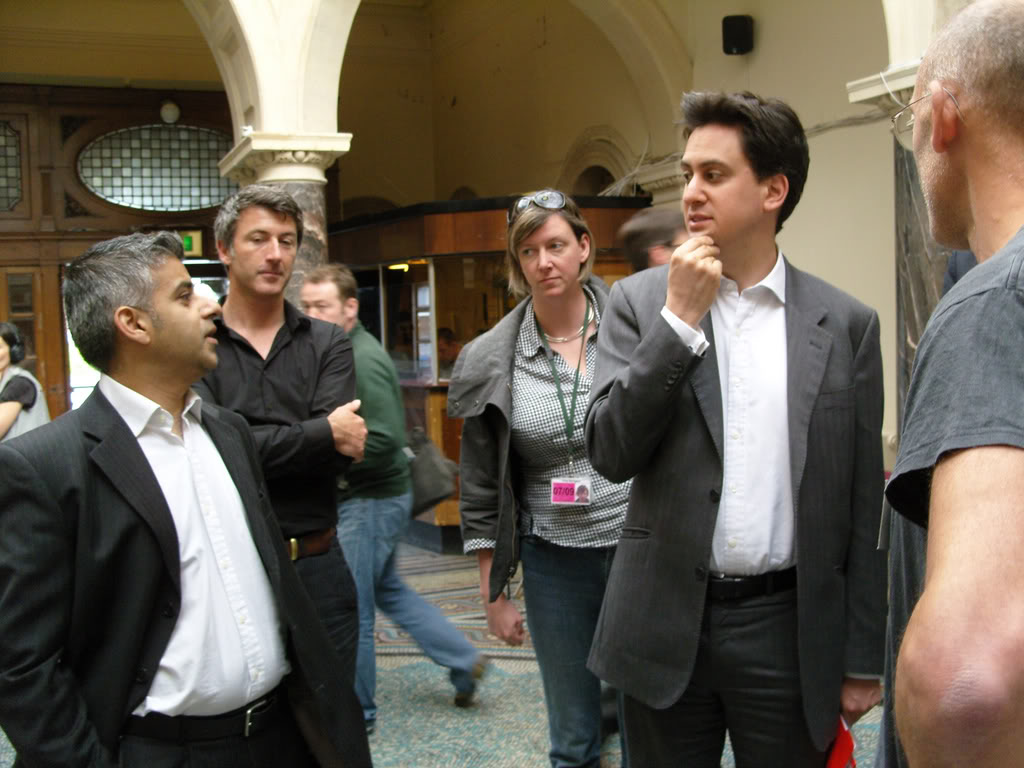It has been another crazy whirlwind of a month, with this weekend set to be the first in five which I get to spend in Transition Town Home, having spoken recently in Bungay, Glastonbury, Belsize Park and the Forest of Dean, as well at the Transition Conference (I hate that name, can’t we call it a ‘Gathering’ or something?) in Battersea, and at the Sunrise Celebration Festival.
One highlight for me was watching the world première of the movie “In Transition” and being surprised and delighted to find that I was in it (having completely forgotten the quick interview they grabbed with me at my book launch!). Another was meeting an A-Level teacher who is already using my book as a teaching aid for his Environmental Design students.
But perhaps of wider interest was the fact that Ed Miliband, Secretary of State for Energy and Climate Change, turned up at the Transition Conference as a ‘keynote listener’, but still managed to drop a few bombshells.

When we buttonholed him for a bit of a chat (audio here, courtesy of Traydio.com), I was pleased to hear that he understood the need for Government to remain a step removed from the Transition movement in order to avoid “strangling” it. However, I must confess I had to refrain from gasping as he declared that:
“If you think about the history of the debate on peak oil as I understand it, climate change makes debate about peak oil a bit of a second-order debate, because we have to start making the transition to low carbon forms of energy in any case. Whether you think that peak oil’s in 2020, 2030 or 2040… I don’t need to have the debate about peak oil… to know that we have to start making the transition as quickly as possible.”
Where to begin? Clearly Ed’s understanding of the history of the peak oil debate differs a little from mine. Let’s start with the obvious – with many experts agreeing that we likely saw peak oil last year, for our Minister for Energy to be pondering how many decades in the future it might lie is, frankly, terrifying.
But what I personally find even more worrying is that he (and thus presumably his department) has not yet grasped that climate change and peak oil often pull in opposite directions. Perhaps Ed should cast his eyes across the Atlantic to the US Congress, where the advocates of Climate Change Bills (to implement strict carbon budgets) are doing battle with the champions of Energy Independence Bills (to subsidise carbon-intensive tar sands and coal-to-liquids projects).

As I wrote here last year, and more recently in The Transition Timeline, there is a very real tension between addressing climate change and addressing peak oil, and policy based purely on one side of this equation could be very destructive indeed. Unfortunately, our government is still caught on the horns of this ‘supply side dilemma’, and is desperately casting around for more rapidly-deployable low-carbon energy supplies.
It is only slowly dawning on them that renewable supply cannot increase as fast as oil and gas are declining, that nuclear only makes the problem worse, and that coal is not an option if we want a habitable planet. The inescapable conclusion is that if we are to treat climate change with the seriousness which it undoubtedly deserves, then we may well have already entered our years of energy descent. The only reasonable response is to find ways to thrive in this context – to reduce energy demand in line with the reducing supply – but as yet Ed still believes that only Denial sells to the voting public:
“In a way I’m less optimistic than you are… you’re optimistic that you can persuade people to adopt a sort of “no growth” model of society – I’m pretty convinced that you couldn’t persuade people of that… Even if you were right about your model of society, I just don’t believe that you’re going to convince people of that”
Actually, I do agree with Ed that we need to think long and hard about what “economic growth” actually means before we debate whether we want it, though I’m not sure we’ll see eye-to-eye when that debate reaches its head.
Of course it doesn’t come as an overwhelming surprise to see my perspective deemed darker yet more optimistic than the Government view, but since the Transition Vision of the future seems about the only desirable outcome out there to shoot for, I think I’ll just keep right on shooting, whether Ed rates our chances or not.
Having said that, with Rob’s recent post on ‘burn out’ in mind, it’s definitely time for a day off for me. Tomorrow is my birthday, and I will be taking a hard-earned breather at Kew Gardens with my beautiful and inspirational girlfriend. Back soon!




I think there are problems with becoming a company director, film star, author , falling in love which perhaps Ed will be familiar with… as a politician has the same problems and rarely overcomes them …
I think that he is right that your outlook is not dark enough , there is a population bulge of older people who are simply way beyond willing to change until the system fails and they want it to change faster than it can…
But I would say your optimism is not optimistic enough either, there are other avenues in mankind’s future which few even acknowledge possible , and indeed few will do in this life.
“there are other avenues in mankind’s future which few even acknowledge possible , and indeed few will do in this life”
could you clarify what you mean…just in case i’m missing out on something here…!
thanks
I was horrified to hear Ed Miliband go even farther in a recent Commons debate:
https://www.parliamentlive.tv/Main/Player.aspx?meetingId=4951&st=12:13:53
Miliband speaks well about the dangers of climate change, but clearly hasn’t grasped the twin issue of peak energy. While excoriating the Tories for opposing renewable energy development, he went on to advocate nuclear power and CCS in relation to coal. Has nobody told him that CCS is a pipe dream?
It is impressive that he attended the Transition Conference, but how did he manage to miss the point?
[…] after. At the earlier meeting he told us to judge him on the results of Copenhagen, and (despite my previous comments, and the fact that the UK is one of the minority of countries who have not endorsed a 350ppm […]
[…] after. At the earlier meeting he told us to judge him on the results of Copenhagen, and (despite my previous comments, and the fact that the UK is one of the minority of countries who have not endorsed a 350ppm […]